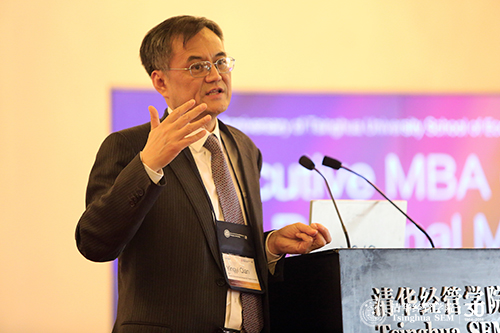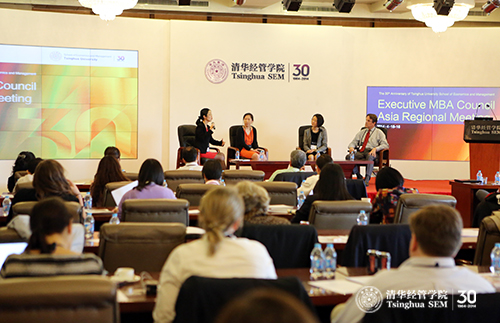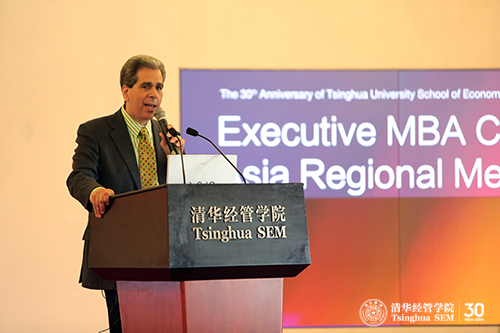The Executive MBA Council Asia Regional Meeting was held at Tsinghua University School of Economics and Management (Tsinghua SEM) on April 15-16. It is the second time for Tsinghua SEM to host the Regional Meeting of the Executive MBA Council after ten years. The topic for this year’s meeting is “Opportunities, Challenges and Difficulties for EMBA education in Asia (China)”. Over 50 delegates from over 30 Asia EMBA programs attended the meeting. Apart from domestic business schools, some top-notch international business schools, such as Kellogg School of Management, Northwestern University, The University of Chicago Booth School of Business, the Wharton School of the University of Pennsylvania and Harvard Business School also participated in the Meeting.

Dean QIAN delivered a keynote speech
Professor QIAN Yingyi , Dean of Tsinghua SEM, delivered a keynote speech "China’s EMBA Education: Features and Innovations". Dean Qian introduced the development of China’s EMBA education over the past years and its unique features, noting that “China is a latecomer in EMBA education, but we are growing rapidly. China’s EMBA education started in 2002, with 30 universities having EMBA program across the country. The total number of EMBA students in China was only 2147 at that time.” By 2013, China already has 63 universities having EMBA program, and the annual enrolled number of EMBA students has grown up to over 8000. Till today, there are accumulated 62,157 students who have taken EMBA education in China. Even though China’s EMBA education started later than our international peers, our annual enrolment is perhaps the largest in the world. At Tsinghua SEM, we enrolled 400 EMBA students every year, which is still not the largest enrolment among China's business schools. China’s EMBA education has several unique features. Most China’s EMBA students are in their 40s. This group of students has high demand for graduate business education because most of them had no opportunities to pursue an MBA degree in their 20s. China’s EMBA education not only grow in scale over the years, but also improve very fast in quality. Out of the top 10 Global EMBA programs in the Financial Times 2013 Global EMBA Ranking, 3 programs are from Chinese mainland, which shows that China’s EMBA education have indeed earned international recognition.

The Executive MBA Council Asia Regional Meeting panel discussion
Dean Qian has noted that, Tsinghua’s EMBA education began in 2002. In 2007, Tsinghua established a partnership with INSEAD to offer a dual degree global EMBA program. In Financial Times 2012 Global EMBA Ranking, the Tsinghua-INSEAD EMBA program was ranked 4th globally, and 1st on Chinese mainland. In 2013, the program was ranked 2nd globally, and remained 1st on Chinese mainland. Our success roots from our continuously internationalization and openness to new ideas. Our founding Dean Zhu Rongji said repeatedly that “The best way to learn is to learn from the best.” Tsinghua EMBA program’s success is also due to our effort in innovation. In 2012, we completely redesigned our Chinese EMBA curriculum into four course blocks: Corporate Environment, Management Functions, Leadership and People, and Inter-Connection and Integration. Moreover, we provide every EMBA students an iPad with an “iEMBA” app, allowing students to download course materials and interact through online discussions. Lastly, Dean Qian mentioned that an exceptional feature in China’s EMBA education is its very strong alumni network. For example, Tsinghua EMBA has accumulated 4473 alumni and students, and the School has set up 42 alumni associations across China.
The meeting continued with two seminars - “Development of English Language Programs in China” and “EMBA Program Best Practice Panel Discussion”. On April 16th, Professor MAO Jiye, Dean of School of Business, Renmin University of China and Professor K. Ravi Kumar, Dean of Business School, Nanyang Technology University of Singapore gave keynote speeches respectively. Dean Mao said the global trends in the EMBA education development have five aspects: emphasis on nurturing the leadership and entrepreneurial spirit, focusing on enterprise social responsibility and business ethics; teaching contents covering not only modern administration knowledge, but also latest trends in international politics, economics and technology development; improvement in students' innovation ability, strategic thinking of global business management and decision-making ability for commanding whole situation; popularity with comprehensive courses, emphasis on integrated knowledge application and decision-making guidance in global competition context; significant differences between EMBA program designs. Subsequently, Dean K. Ravi Kumar shared his years of experience in EMBA education and his expertise.

The Executive Director of the Executive MBA Council Michael Desiderio delivered closing remarks
To conclude the meeting, the Executive Director of the Executive MBA Council Michael Desiderio delivered closing remarks. Mr. Desiderio believed that China has an immense potential in EMBA education, and the Executive MBA Council would like to strengthen its partnership with the Chinese business schools to promote further China’s EMBA education.
The Executive MBA Council has members in more than 200 business schools from over 25 countries. In 1981, this non-profit organization was established under the assistance of AACSB (The Association to Advance Collegiate Schools of Business) with the aim of driving global Executive MBA education. AACSB was established in 1916 by 16 renowned American universities and was the first non-profit organization that provides business education accreditation. Tsinghua EMBA program joined the Executive MBA Council in 2003, and hosted the 2004 Executive MBA Council Asia Pacific Regional Meeting, the first time the regional meeting was hosted in China.
 Latest News
Latest News